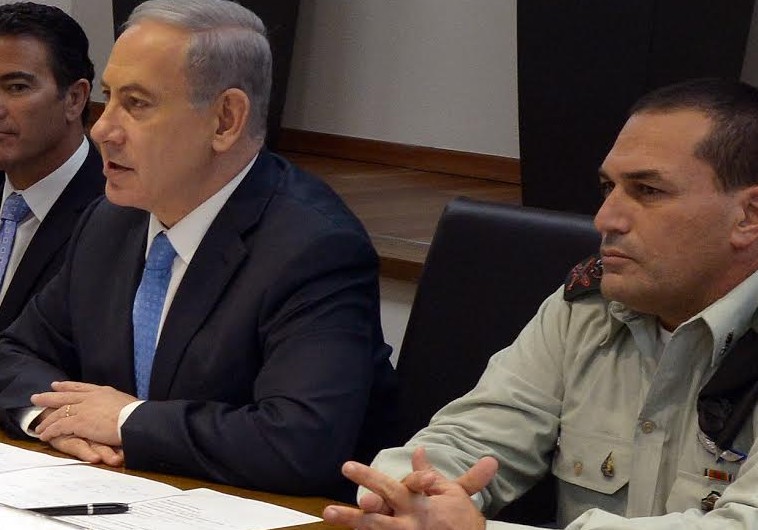Israeli PM, Netanyahu: Palestinian Authority is an entity allied with terror group, not a state
The Jerusalem Post
02/01/15
The Palestinian Authority is not a country, but rather a group allied with a terrorist organization, and for that reason its appeal to the International Criminal Court should be rejected out of hand, Prime Minister Benjamin Netanyahu said on Thursday. Netanyahu’s comment came at the end of an interministerial meeting he convened in Tel Aviv to discuss ways to combat the Palestinian Authority’s signing of the Rome Statute and its intention of bringing Israelis to the court on war crimes charges.
“We expect the International Criminal Court to completely reject the hypocritical act by the Palestinian Authority, because the Palestinian Authority is not a state. It is an entity in an alliance with a terrorist organization, Hamas, that commits war crimes,” he said. Israel, Netanyahu said, is by contrast a “law abiding state with a moral army that upholds international law.”Israel, he promised, would defend the IDF’s soldiers, “just as they defend us.”
The participants at the meeting discussed ways to respond to the Palestinian move, though no operative decisions were announced. Among the proposals was for Israel to back civil suits by victims of terrorism around the world against the PA – and demand monetary damages – for supporting terrorism. Such suits have successfully been brought against Iran and Syria. The PA, however, was undeterred by Israeli threats to respond and US disapproval of its moves, and on Thursday delivered applications to join 20 international organizations and treaties to UN official James Rawley.
Chief PLO Negotiator Saeb Erekat, who delivered the applications to Rawley during a meeting in Ramallah, said, “Today we are honored to hand the deputy special coordinator for the Middle East peace process Palestinian papers to join a set of international conventions and treaties, including the Rome Statute of the International Criminal Court.” Erekat dismissed Israeli criticism of the decision to join the ICC. “Israel regarded it asThe Palestinian Authority is not a country, but rather a group allied with a terrorist organization, and for that reason its appeal to the International Criminal Court should be rejected out of hand, Prime Minister Benjamin Netanyahu said on Thursday.
Netanyahu’s comment came at the end of an interministerial meeting he convened in Tel Aviv to discuss ways to combat the Palestinian Authority’s signing of the Rome Statute and its intention of bringing Israelis to the court on war crimes charges. “We expect the International Criminal Court to completely reject the hypocritical act by the Palestinian Authority, because the Palestinian Authority is not a state. It is an entity in an alliance with a terrorist organization, Hamas, that commits war crimes,” he said. Israel, Netanyahu said, is by contrast a “law abiding state with a moral army that upholds international law.”
Israel, he promised, would defend the IDF’s soldiers, “just as they defend us.”The participants at the meeting discussed ways to respond to the Palestinian move, though no operative decisions were announced. Among the proposals was for Israel to back civil suits by victims of terrorism around the world against the PA – and demand monetary damages – for supporting terrorism. Such suits have successfully been brought against Iran and Syria.
The PA, however, was undeterred by Israeli threats to respond and US disapproval of its moves, and on Thursday delivered applications to join 20 international organizations and treaties to UN official James Rawley. Chief PLO Negotiator Saeb Erekat, who delivered the applications to Rawley during a meeting in Ramallah, said, “Today we are honored to hand the deputy special coordinator for the Middle East peace process Palestinian papers to join a set of international conventions and treaties, including the Rome Statute of the International Criminal Court.”
Erekat dismissed Israeli criticism of the decision to join the ICC. “Israel regarded it as an act of aggression against it, but we are exercising a civilized right based on international law and legitimacy,” he said. Erekat said that the first case the Palestinians would take to the ICC was Israeli settlements, which he dubbed a “war crime.” If Israel was afraid of the ICC, “it should stop perpetrating crimes,” he said. “Our message to the world is that we will defend our people everywhere against the crimes committed against them, including assassinations, demolitions, settlements and the aggression on the Gaza Strip. Those who commit crimes will have to bear the consequences.”
He criticized the US for continuing to deal with Israel as a “country above law.” Erekat called on Washington to reconsider its positions and demonstrate more responsibility.
“We demand that the US support international legitimacy by ending occupation and assassinations.” He also called for ending Israeli “terrorism” as a way of defeating terrorism in the region. If the Palestinians do take Israel to the court, they stand to face blowback not only from Israel, but from the US – which condemned the application – as well.
Sen. Chuck Schumer (D-New York) warned the PA that the “recent appropriations bill signed into law will restrict US funding if the PA attempts to initiate an investigation through the ICC.” The US provides more than $400 million in annual aid to the PA. Annual appropriations legislation for the funds given the PA includes a clause saying that no economic support will be allowed if the PA initiates “an International Criminal Court judicially authorized investigation, or actively support[s] such an investigation, that subjects Israeli nationals to an investigation for alleged crimes against Palestinians.” The US secretary of state, could, however, waive this clause if he shows that doing so would further Middle East peace.
While Defense Minister Moshe Ya’alon and Intelligence Minister Yuval Steinitz were at the meeting convened by Netanyahu to talk about the matter, Foreign Minister Avigdor Liberman was not, reflecting the tension between Netanyahu and Liberman leading up to the election.
In recent weeks, Liberman has been harshly critical of the prime minister, especially of his performance during Operation Protective Edge last summer. Foreign Ministry officials close to Liberman said that Netanyahu’s failure to invite Liberman to the meeting shows that the prime minister is not truly interested in providing a solution to the problem, and only wants to hear from yes-men who will agree with his positions.
It is a shame, the officials said, that “political interests” will harm critical diplomatic work. The Foreign Ministry’s director- general, Nissim Ben-Sheetrit, did attend the meeting.
A source in the Prime Minister’s Office dismissed the criticism coming from Liberman associates, saying that Netanyahu was gathering recommendations for action, and that once decisions were made, they would be taken for approval to the security cabinet, where Liberman is a member.

















